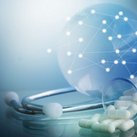ECPM Course
Certificate or Diploma of Advanced Studies in Pharmaceutical Medicine
» Download ECPM Course Brochure
Registration and start with Module 2 open until January 4, 2026.
The ECPM course program consists of 24 face to face teaching days divided into six modules over a period of two years (four days from Monday to Thursday, eight hours per day, each lesson 45–75 minutes), including team involvement in mentored, case-oriented breakout sessions. In addition, approximately eight hours of distance learning per module is required in order to prepare for the case studies. The course language is English.
The ECPM course is a postgraduate education which is called in the European Bologna System either Certificate or Diploma of Advanced Studies, i.e. CAS or DAS in Pharmaceutical Medicine.
To register for the ECPM course, please scroll down to the end of the page, where you will find the registration buttons..
Two Parts form the ECPM Course
ECPM Course Modules - The focus of the ECPM Course Modules is on teaching the fundamentals of modern drug development.
– two types of degrees: Upon completion of the six modules, students can sit the multiple choice (MCQ) examination, resulting in a Certificate (CAS) in Pharmaceutical Medicine. In order to achieve a Diploma (DAS) in Pharmaceutical Medicine, students will need to take the MCQ exam, as well as an oral and an essay exam. The diploma forms also part of the Swiss Specialist title in Pharmaceutical Medicine for MDs.
– You can choose one or the other option (CAS or DAS) when registering for the final examination after the fifth Module.- Continuing Education Seminars – ‘Frontiers in Drug Development’ - While the first three days of each module focus on teaching the fundamentals of drug development, the fourth day is conducted as a seminar, dedicated to new trends and developments in drug development science.







